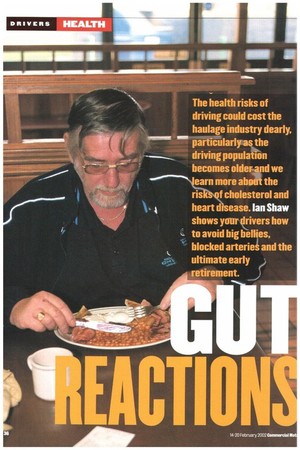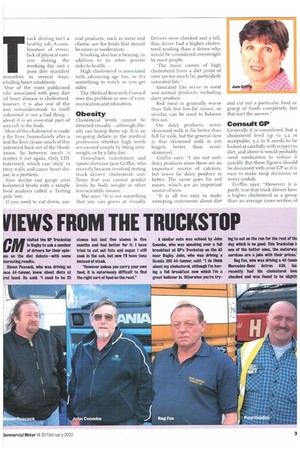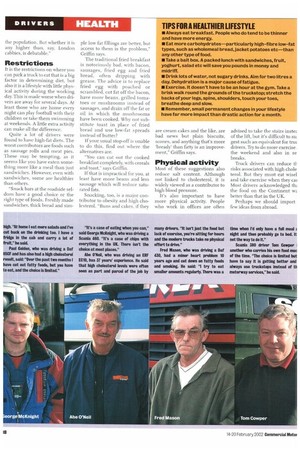The health risks of driving could cost the haulage industry
Page 36

Page 37

Page 38

If you've noticed an error in this article please click here to report it so we can fix it.
dearly, particularly akthe driving population becomes oldepAnd we earn more alma the riskqf cholesterol and heart d ease. Ian Shaw Shows your Opvers how to avoid big bellies, blocked arteriei and the ultimate early ) retirement.
Truck driving isn't a healthy job. A combination of stress, lack of physical exercise during the working day and a poor diet manifest temselves in several ways, icluding heart conditions.
One of the most publicised vils' associated with poor diet ad heart disease is cholesterol. lowever, it is also one of the lost misunderstood. In itself iolesterol is not a bad thingideed it is an essential part of iery cell in the body.
Most of the cholesterol is made y the liver. Immediately after a aeal the liver cleans much of this nolesterol back out of the bloodream. In between meals it :-.cretes it out again. Only LDI. holesterol, which can 'stick' to rtery walls and cause heart disase, is a problem.
Your doctor can gauge your holesterol levels with a simple lood analysis called a 'fasting pids' test.
If you need to cut down, ani
mal products, such as meat and cheese, are the foods that should be eaten in moderation.
Smoking also has a bearing, in addition to its other proven risks to health.
High cholesterol is associated with advancing age too, so it's something to watch as you get older.
The Medical Research Council sees the problem as one of communication and education,
Obesity
Cholesterol levels cannot be detected visually—although obesity can bump them up. It is an on-going debate in the medical profession whether high levels are caused simply by being overweight, or by a fatty diet.
Consultant nutritionist and sports dietician Jane Griffin, who recently became involved testing truck drivers' cholesterol, confirms that you cannot predict levels by body weight or other less-scientific means.
She says: "It is not something that you can guess at visually. Drivers were checked and a tall, thin driver had a higher cholesterol reading than a driver who would be considered overweight by most people.
"The main causes of high cholesterol from a diet point of view are too much fat, particularly saturated fats."
Saturated fats occur in meat and animal products, including dairy produce.
Red meat is generally worse than fish but low-fat mince, or similar, can be used to balance this out.
On dairy products, semiskimmed milk is far better than full fat milk, but the general view is that skimmed milk is not hugely better than semiskimmed.
Griffin says: "I am not antidairy products since these are an important source of calcium, but lower fat dairy produce is better. The same goes for red meats, which are an important source of iron.
"It is all too easy to make sweeping statements about diet and cut out a particular food or group of foods completely, but that isn't the answer."
Consult GP
Generally it is considered that a cholesterol level up to 5.2 is acceptable, 5.2 to 6 needs to be looked at carefully with respect to diet, and above 6 would probably need medication to reduce it quickly. But these figures should be discussed with your GP as it is easy to make snap decisions or worry unduly.
Griffin says: "However, it is partly true that truck drivers haw a higher cholesterol as a grour than an average cross-section ol the population. But whether it is any higher than, say, London cabbies, is debatable."
Restrictions
It is the restrictions on where you can park a truck to eat that is a big factor in determining diet, but also it is a lifestyle with little physical activity during the working day. This is made worse when drivers are away for several days. At least those who are home every night can play football with their children or take them swimming at weekends. A little extra activity can make all the difference.
Quite a lot of drivers were found to have high-fat diets. The worst contributors are foods such as sausage rolls and meat pies. These may be tempting, as it seems like you have eaten something more like a meal than just sandwiches. However, even with sandwiches, some are healthier than others.
"Snack bars at the roadside seldom have a good choice or the right type of foods. Freshly made sandwiches, thick bread and sitr
ple low fat fillings are better, but access to them is the problem," Griffin says.
The traditional fried breakfast is notoriously bad, with bacon sausages, fried egg and fried bread, often dripping with grease. The advice is to replace fried egg with poached or scrambled, cut fat off the bacon, have more beans, grilled tomatoes or mushrooms instead of sausages, and drain off the fat or oil in which the mushrooms have been cooked. Why not substitute toast in place of fried bread and use low-fat spreads instead of butter?
if your usual stop-off is unable to do this, find out where the alternatives are.
"You can cut out the cooked breakfast completely, with cereals and toast," says Griffin.
If that is impractical for you, at least have more beans and less sausage which will reduce saturated fats.
Snacking, too, is a major contributor to obesity and high cholesterol. "Buns and cakes, if they are cream cakes and the like, are bad news but plain biscuits, scones, and anything that's more 'bready' than fatty is an improvement," Griffin says.
Physical activity
Most of these suggestions also reduce salt content. Although not linked to cholesterol, it is widely viewed as a contributor to high blood pressure.
It's also important to have more physical activity. People who work in offices are often advised to take the stairs instez of the lift, but it's difficult to su, gest such an equivalent for tnic drivers. Try to do more exercise the weekend and also in re breaks.
Truck drivers can reduce tlrisks associated with high chole terol. But they must eat wisel and take exercise when they cal Most drivers acknowledged thi the food on the Continent wz better than that in the UK.
Perhaps we should import few ideas from abroad.
IEWS FROM THE TRUCKSTOP
mvii n*sit:uegdb yt ht eo a sil Pk Tar uncukn is tbeo pr of drivers for their opinins on the diet debate—with some teresting results.
Simon Peacock, who was driving an ieco 44-tonner, knew about diets at Irst hand. He said: "I used to be 23 stones but lost five stones in five months and feel better for it. I have tried to cut out fats and sugar. I still cook in the cab, but now II have tuna instead of steak.
"However unless you carry your own food, it is notoriously difficult to find the right sort of food on the road." A similar note was echoed by John Coombe, who was speaking over a full breakfast at BP's Truckstop on the AS near Rugby. John, who was driving a Scania 360 44-tanner, said: "I do think about my cholesterol, although I'm having a full breakfast now which I'm a great believer in. Otherwise you're try ing to eat on the run for the rest of thi day which is no good. This Truckstop one of the better ones, the motorwa! services are a joke with their prices.'
Reg Fox, who was driving a 44-teem Mercedes-Benz Actros 430, ham recently had his cholesterol leve checked and was found to be shghtk
ligh. "At home I eat more salads and I've ut back on the drinking too. I have a Fridge in the cab and carry a lot of Fruit," he said.
Paul Golden, who was driving a Oaf 35CF and has also had a high cholesterol vsult, said: "Over the past two months I lave cut out fatty foods, but you have to eat, and the choice is limited." "It's a case of eating when you can," said George McKnight, who was driving a Scania 460. "It's a case of chips with everything in the UK. There isn't the choice at most places."
Abe O'Neil, who was driving an ERF EC10, has 37 years' experience. He said that high cholesterol levels were often seen as part and parcel of the job by many drivers. "It isn't just the food but lack of exercise, you're sitting for hours and the modern trucks take no physical effort to drive."
Fred Mason. who was driving a Oaf 430, had a minor heart problem 10 years ago and cut down on fatty foods and smoking. He said: "I try to eat smaller amounts regularly. There was a
time when I'd only have a full meal ; night and then probably go to bed. It not the way to do it."
Scania 380 driver Tom Cowper another who carries his own food muc of the time. -The choice is limited but have to say it is getting better and always use truckstops instead of tli motorway services," he said.












































































































































